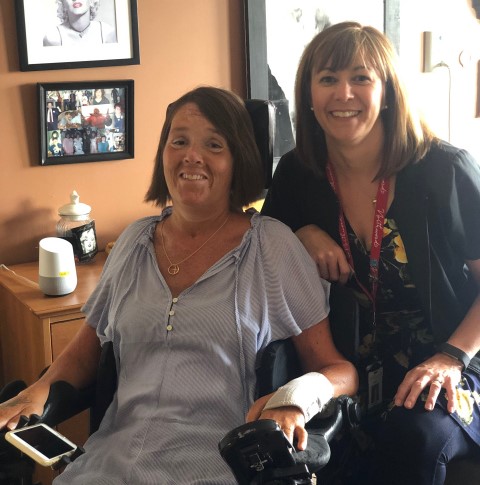Like most Canadians, Jacklyn has been using SMART tech solutions in her home. Her home just happens to be in long-term care where she can now, for the first time in 21 years, regain control over her world after a slip and fall left her paralyzed from the chest down.
“The most exciting thing for me has been being able to turn on my TV for myself,” says Jacklyn, “I don’t have to wait for a nurse to walk by – I hate using my call bell and the reality for me is I can’t do anything without assistance.”
Jacklyn lives at Northwood, a not-for-profit continuing care organization in Halifax, Nova Scotia. Northwood, the Nova Scotia Health Authority, and national and international partners, have been awarded funding through AGE-WELL, Canada’s Technology and Aging Network, to advance research on SMART assistive technology and person-centred care solutions in continuing care. Using off the shelf devices and Canadian start-up Novalte’s breakthrough Emitto technology, the research will explore how to enable older people aging with complex mobility needs to live with greater independence and dignity. Offering remote ongoing support, Novalte’s system reduces the tech burden on both the client and organisation, facilitating technology adoption. From changing the channel to bed control, Emitto allows clients to take care of tasks independently and caregivers to ensure relationships and complex care needs come first.
“The nurses used to have to come help me with everything,” explains Jacklyn, “Now when they come to check on me, I can tell them that I don’t need their help and that feels so good.”
The research team is led by Dr. Susan Kirkland, Professor and Head of the Department of Community Health and Epidemiology, at Dalhousie University and Central Zone NSHA. “Over the next year, our team will set the stage for future success: we will continue to build partnerships and team capacity; develop knowledge mobilization and commercialization plans; strengthen relationships with stakeholders; develop collaborations with other AGE-WELL projects; and recruit the full research team,” says Dr. Kirkland. “The team will be ready to hit the ground running in April 2020.”
The research team brings together specialist expertise in rehabilitation engineering, data analytics and person-centred care. All project phases prioritize engagement of older adults to ensure their experiences and needs drive customization and evaluation of the technology. For example, research participants will self-report the impact of the technology on their well-being, independence, social connectedness and health supported by Age Care Technologies (ACT) of Scotland. Working to improve the lives of older people, globally, through development of tools and training in person-centred care, the ACT tool was recently recognized by the International Longevity Center–UK as a one-of-seven high-impact innovations for affordable and sustainable healthcare in the 21st century.
The project will also use state of the art knowledge based tools to drive care planning pathways, empowering point of care staff where it matters most. Think Research, project partner and leading provider of evidence-based clinical decision support tools, will build standardized, innovative and easy-to-use solutions to support this project. These digital tools will incorporate SMART tech into clinical workflows and facilitate measurement of quality improvement, enabling improved health outcomes.
The big picture is to explore the feasibility, usability, sustainability and scalability of SMART tech solutions to support increased quality of life for residents and clients in Continuing Care. The team has been allocated a Catalyst Award of $30,000 for one year of seed funding. Projects that demonstrate sufficient progress during the Catalyst phase will be selected for three-year funding of up to $600,000, commencing April 1, 2020 as part of AGE-WELL’s Core Research Program, contingent on AGE-WELL’s renewal.
This initiative, first of its kind in North America, could shift how care is delivered for this client population. The collaborative national and international team now engaged in this research seeks to create a community that inspires a self-directed experience, restoring the “power of choice” to people, so that they can truly live more.
“The research team will be embedded in the Northwood community enabling rich daily connections with residents, staff and families,” says Margaret Szabo, Northwood’s Director of Business Development and Project Co-lead. “At Northwood, one of our core values is ‘we can always do better’ and we live this value by investing in innovation and new technologies. Northwood will act as a Living Innovation Lab helping to drive action-oriented research that directly helps older adults to live more in a community of belonging, dignity and choice.”
For Jacklyn, this technology means she has a voice to make those choices for herself.
“I still have a voice inside my body, and with the technology I’m able to use my voice to do things my body can’t,” explains Jacklyn, “If you can change one small thing for the better in my little world, it can have a huge impact.”
Stephanie McDougall is the Communications & Marketing Specialist at Northwood.




